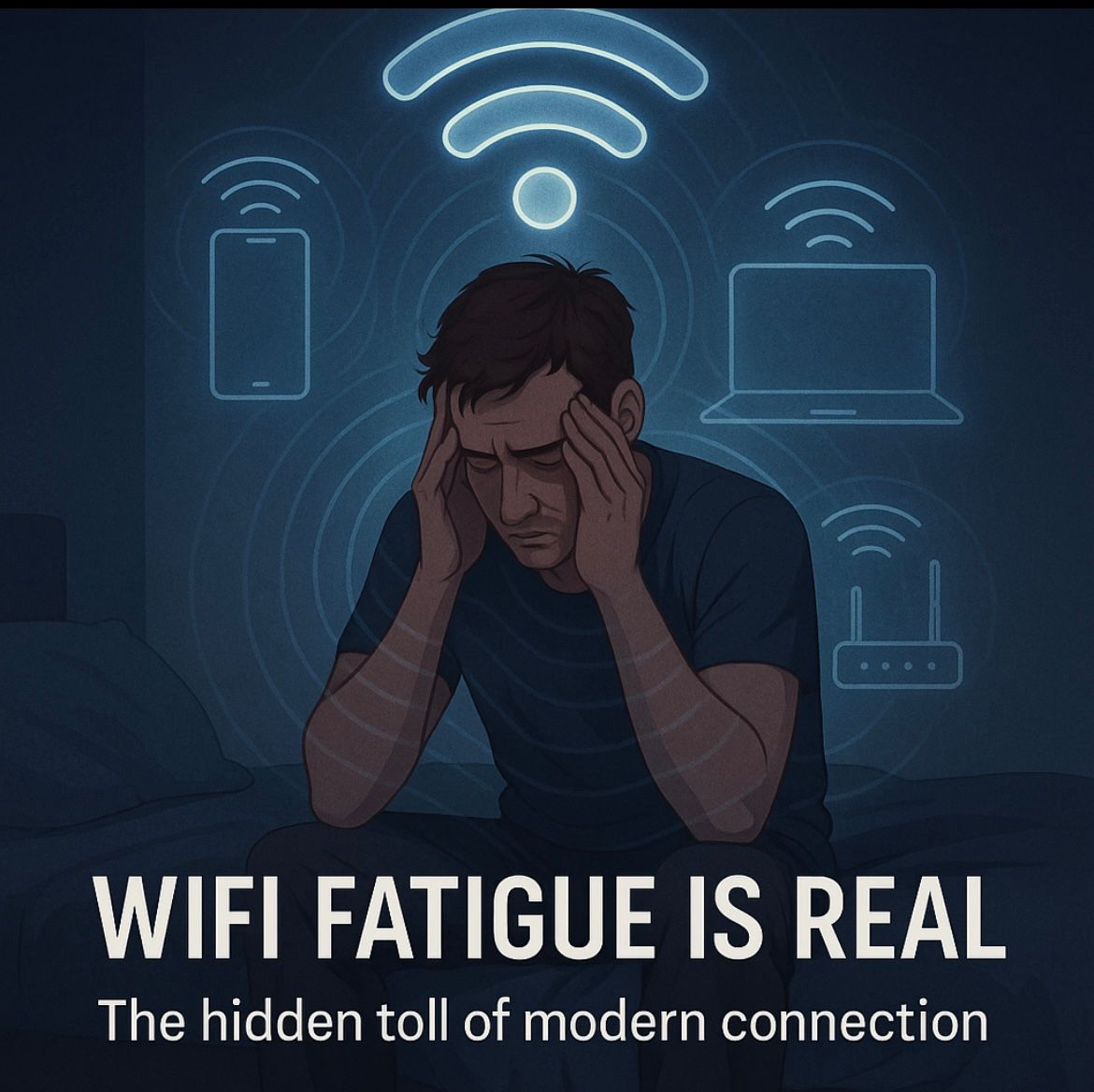WiFi Fatigue Is Real: How Constant Exposure Affects Your Body
The unseen effects of constant wireless exposure on sleep, hormones, and the nervous system
We live in a world that never truly powers down. Laptops stay on. Phones never leave our side. Routers pulse wirelessly 24/7. And while WiFi has made our lives more convenient, there’s growing evidence it may also be quietly draining our health.
Most people never stop to consider the cumulative effects of nonstop wireless exposure. But if you’re dealing with chronic fatigue, brain fog, anxiety, sleep issues, or hormone imbalances… your WiFi signal may be part of the problem.
WiFi operates on radiofrequency (RF) electromagnetic fields (EMFs), a form of non-ionizing radiation. While this type of radiation doesn’t immediately damage DNA like X-rays or UV rays, prolonged exposure especially at close range can disrupt cellular signaling, increase oxidative stress, and affect how your nervous system functions.
Here’s where it gets concerning:
- WiFi doesn’t turn off.
- Your body doesn’t get a break.
- Your mitochondria (the energy producers in your cells) are particularly sensitive to these invisible stressors
Emerging studies suggest that long-term exposure to EMFs can contribute to symptoms like:
- Poor sleep quality and disrupted melatonin levels
- Increased cortisol (your stress hormone)
- Chronic fatigue and low energy
- Headaches, dizziness, or “wired but tired” sensations
- Hormone disruption, especially in women
- Heightened anxiety or mood imbalances
A 2019 study published in Environmental Research found that exposure to wireless radiation affects the blood-brain barrier and may be linked to neurobehavioral issues. While the industry continues to debate these effects, more researchers are urging caution especially for those already dealing with chronic illness or neurological symptoms.
Most people assume that because WiFi is everywhere, it must be safe. But convenience does not equal safety. The real issue isn’t one-time exposure. It’s the chronic, cumulative stress of never giving your body a break.
You might turn off the lights at night. But your body is still being stimulated by devices pulsing signals even while you sleep.
At Executive Functional Healing, we look beyond nutrition and lab results. We assess environmental stressors—like EMFs—that silently sabotage healing.
For clients dealing with chronic fatigue, burnout, or hormonal chaos, one of the most overlooked steps is creating an electromagnetic hygiene routine. That includes strategies like:
- Turning off WiFi at night
- Keeping phones on airplane mode during sleep
- Using ethernet instead of wireless when possible
- EMF shielding tools (when appropriate)
- Supporting the nervous system through vagal tone, grounding, and mineral balance
These aren’t fringe ideas. They’re part of a root-cause strategy that puts your body back in a healing state.
Your Wake-Up Call: Rest Isn’t Just About Sleep
If you’re doing “all the right things” but still waking up tired, can’t focus, or feel burnt out it may be time to look at what’s pulsing silently in the background.
True rest means removing hidden stressors. And WiFi could be one of the biggest invisible ones in your home.
“I didn’t believe it until I tried it. I started turning off the router at night, and within days, I started waking up feeling rested again. My anxiety even started to drop. I didn’t realize how much background stress I was living with.”
Executive Functional Healing Client
Q: Is there actual proof WiFi is harmful?
A: There is growing evidence suggesting biological effects from long-term EMF exposure, including WiFi. While more human studies are needed, many countries have already implemented precautionary limits.
Q: Do I need to get rid of WiFi altogether?
A: Not necessarily. The key is reducing chronic exposure and allowing your body recovery time especially at night.
- WiFi emits constant non-ionizing radiation (EMFs)
- Symptoms may include fatigue, sleep issues, hormone disruption
- Chronic exposure matters more than short bursts
- Turn off routers and devices at night
- Use airplane mode and wired options when possible
- Healing requires reducing all forms of stress—including invisible ones
Your healing environment matters. If you’re stuck in survival mode despite clean eating and good habits, it’s time to look deeper.
Let’s uncover the hidden stressors blocking your recovery.
Visit www.ExecutiveFunctionalHealing.com to book your consultation.
Want honest conversation around topics like this that you can’t post on public platforms?
Join our private Facebook group, Executive Healing Circle, where we talk freely.

